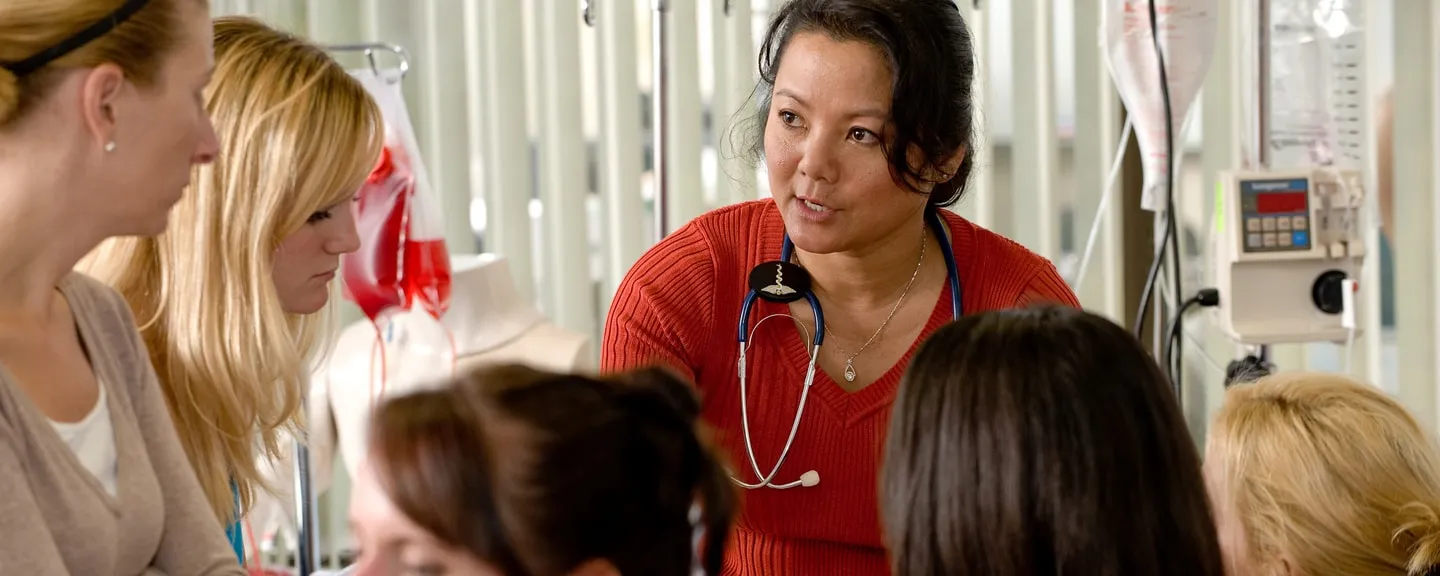- Home
- >
- APU Articles
- >
- News Article
A Master’s in Nursing Education Provides Exciting Career Options
December 11, 2018 | Written By Naomi Mannino

“If you’re on your way to a bachelor’s degree, or already have your Bachelor of Science in Nursing and are working as a nurse, then going ahead with your master’s in nursing education will have you primed to land a much-needed spot teaching future nurses,” noted Dr. Lawrence Santiago, assistant professor and chair of graduate nursing education at Azusa Pacific University.
Why Is There a Nursing Faculty Shortage?
According to a recent report from the American Association of Colleges of Nursing, the average age of Master of Science in Nursing (MSN) degree-holding nurse educators currently falls between 51 and 59. That means the career lifespan for this profession is often cut short by retirement, leaving a need for a constant stream of new nurse educators. In fact, every year, thousands of qualified nurse applicants are turned away from master’s programs due to faculty shortages.
“If you like the idea of having an influence on others and sharing your expertise on nursing with those studying to become a nurse, then this might be a fulfilling career path for you,” advised Dr. Santiago, who said he always loved teaching, even before he became a nurse. “This is also perfect for those nurses who burn out from bedside nursing—which can be a very stressful job—and are looking for another career within the field.”
Where Else Can a Nurse Educator Teach?
Aside from the typical academic setting in a university, nursing school, or a community college, there are many other places to teach with a master’s in nursing education, according to Dr. Santiago. “In my earlier career, I was an education program coordinator at a hospital for seven years and responsible for nurses’ professional development,” he explained. “It was my job to encourage nurses to go back to school for higher degrees and specialty certifications and keep up with annual skills and quality improvement projects, which was very fulfilling to me as both a nurse and an educator.”
In addition to hospitals and medical centers, other places nurse educators can teach (based on their field and level of experience, areas of specialty, and clinical skills) are online and in clinical or community settings. This includes county health departments or clinics as well as in the private sector for medical equipment companies.
What Technology Do Nurse Educators Use?
Because real-life nursing scenarios are interdisciplinary situations involving many practitioners who work together to save a patient’s life, nurse educators use exciting technology to hone their skills. Oftentimes, they train with simulators for drills and advanced practices—just like flight simulators help train pilots.
“A classic example is running a code blue, which is when a patient stops breathing and their heart stops,” Dr. Santiago said. “Using simulations is a great way to get students up to speed and teach concepts and skills without causing harm to a real patient.”
Take Advantage of the Nurse Faculty Loan Program
There are a number of funding opportunities for students studying at Azusa Pacific University. For instance, the Nurse Faculty Loan Program is a federal loan forgiveness program that educates and trains qualified nurse educators to fill vacant nursing faculty positions.
“Finances can be a major barrier to going back to school; this federal loan program eliminates that barrier because it pays 85 percent of your MSN nurse educator tuition as long as you work as an educator for a school for four years or have two adjunct positions afterward,” Dr. Santiago explained.
It’s a good sign that you want to teach nursing if you feel a sense of fulfillment at just the thought of it, Dr. Santiago advised. By teaching others quality nursing skills, you extend your hand far and wide, helping each nurse’s future patients.
Are you interested in influencing the next generation of nurses? Consider pursuing an MSN in Nursing Education at Azusa Pacific University.